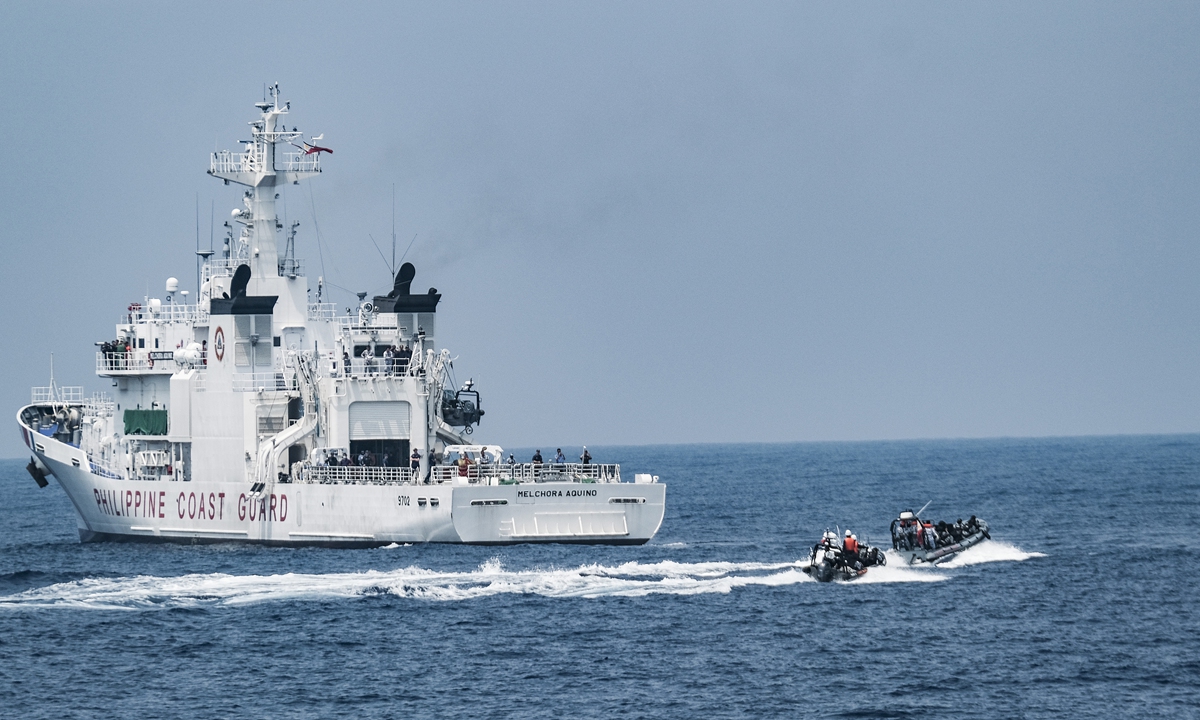
The US, Japan and the Philippines stage a trilateral Coast Guard drill on June 6, 2023. Photo: VCG
Japan, the only country to have ever suffered from atomic bombings during wartime, is gradually breaking its "Three Non-Nuclear Principles" of not possessing, not producing and not permitting the introduction of nuclear weapons, and places itself at nuclear risk by aligning with the US to create their first joint document on extended deterrence.
In a recent development, the two allies are working on drawing up their first joint document on extended deterrence, in which the US uses its military capabilities, including its nuclear umbrella, to protect Japan, Japanese media outlet Yomiuri Shimbun disclosed on Sunday evening.
The Japanese government has long claimed to maintain safety under the "Three Non-Nuclear Principles" in line with Japan's Peace Constitution. But if Japan provides base facilities and other military conveniences to facilitate the deployment of nuclear weapons under the US' "Indo-Pacific Strategy," it cannot be considered a true non-nuclear country and will only put itself in a more dangerous position, Chinese observers warned. They pointed out this will again pose a threat to peace and security in the Asia-Pacific.
Citing the so-called growing nuclear threats from countries such as China and Russia, the Yomiuri Shimbun reported Sunday that the US and Japan aim to increase their deterrence by clearly articulating in the document the US' "unwavering determination."
The Yomiuri Shimbun cited Japanese government sources as saying that the foreign and defense ministers from US and Japan will hold talks on nuclear deterrence and other issues in Tokyo later this month to confirm the direction of the document.
According to the media outlet, the document will include the US' determination to contribute to deterrence around Japan through its nuclear weapons and other capabilities, according to sources. The document is expected to provide direction on what situations Japan should face in order for the US to retaliate.
The US and Japan reportedly aim to compile the document before the end of the year.
Extended deterrence is a security measure in which allied countries prevent aggression from third countries by showing their intention to take retaliatory action if any of them come under military attack, the media outlet said, noting that the US provides its nuclear umbrella and other deterrence capabilities, including conventional weapons, to Japan, South Korea and NATO member states.
The promise of "nuclear weapons protection" exposes that the US has actually lost the ability and confidence to protect its allies, fearing that they may not loyally follow it. This is why they have resorted to deploying nuclear weapons to rebuild their allies' confidence in the US "security commitment," according to some Chinese observers.
As Japan was a defeated country during WWII and the only country to have ever suffered atomic bombing during wartime, the potential nuclear defense document will undoubtedly spark vigilance and aversion among Japanese society and in the international community, Lü Chao, a Korean Peninsula issues expert at the Liaoning Academy of Social Sciences, told the Global Times on Monday.
Yomiuri Shimbun appears to attempt to justify the US-Japan nuclear defense plan by hyping the "China threat" rhetoric as it claimed that China "is trying to beef up its nuclear and non-nuclear military capabilities in an opaque manner."
Lü refuted the claims, condemning the US-led Western clique, which includes Japan, for continuing to provoke and create crisis situations in the Taiwan Straits and South China Sea that clearly target China.
Since WWII, Japan has not deeply reflected on its war crimes, and militarism in Japan has not been thoroughly addressed, with ongoing ambitions for dominance in the Asian region, especially East Asia, the expert revealed.
With Japan's military strength continuing to grow, Japan has now completely exceeded its exclusively defense-oriented policy, Lü believes.
"We must maintain a high level of vigilance against all of Japan's revival of militarism, including relying on the expansion of US military security influence overseas," Lü said.
On one hand, Japan is cooperating with the US' "Indo-Pacific Strategy," appearing to be obedient and serving as a pawn for the US, but in reality, it is constantly expanding its military strength, aiming to achieve its delusion for dominance in the Asian region, he noted.




